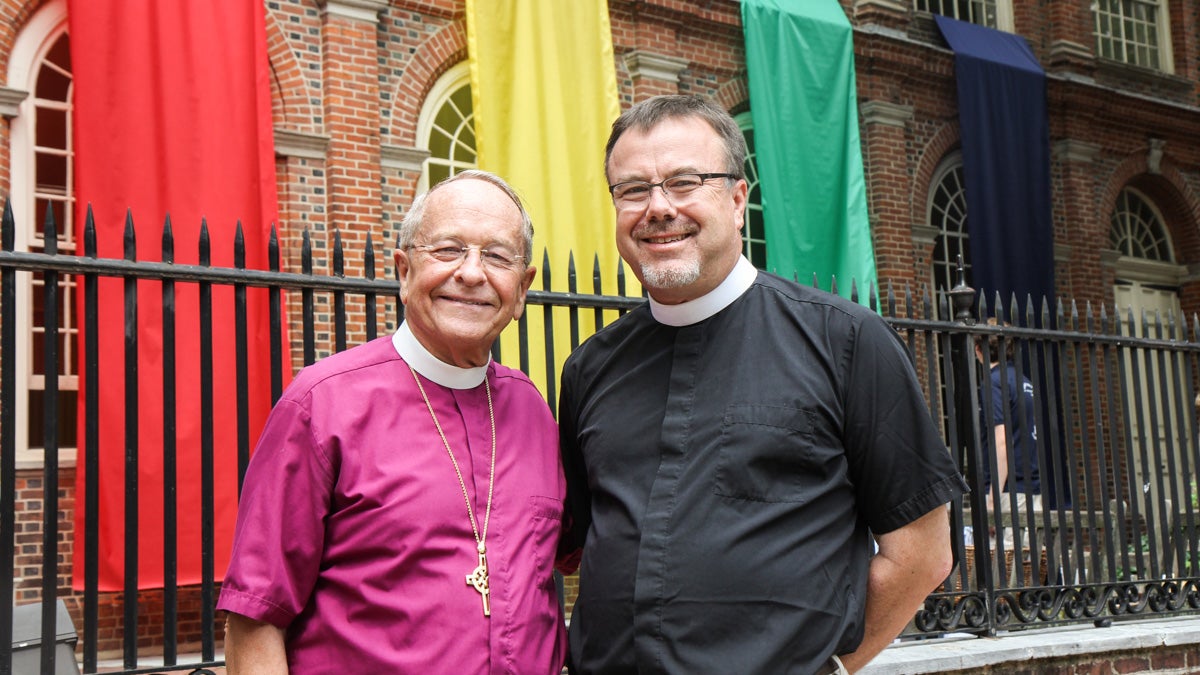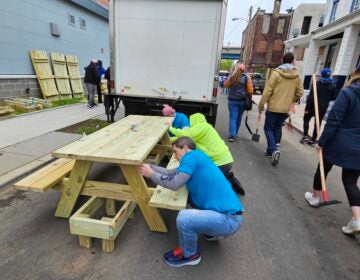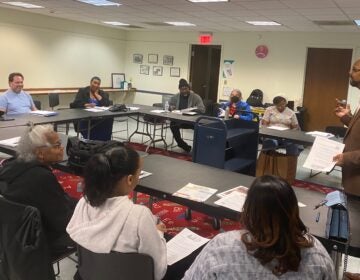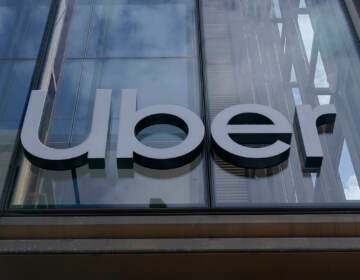Gene Robinson: LGBT movement has duty to bolster ‘justice for all’
Listen
Bishop Gene Robinson and Christ Church rector Timothy Safford are shown in Philadelphia on the 4th of July weekend, 2015. (Kimberly Paynter/WHYY)
Sometimes events in life converge in a way that tips over-the-top celebration and greater awareness into nothing less than genuine transformation. About a week ago, I was lucky enough to experience such a moment.
Gene Robinson, the ninth Episcopal Bishop of New Hampshire, a senior fellow at the Center for American Progress, and well known as the first openly gay man to be elected as a bishop in the Episcopal Church back in 2003, came to Philadelphia to join many other extraordinary people for Equality Forum‘s celebration of the 50th anniversary of the gay rights movement in Philadelphia.
I was able to snag a few minutes with him before the Friday afternoon National Interfaith Service hosted by Christ Church Philadelphia. He sat down upstairs in the gallery beside the pipe organ for conversation with the Rev. Tim Safford, rector of Christ Church. Safford asked him about what was next for the LGBT community. And then in one of those “a picture’s worth 1,000 words” moments, the two headed outside to the south side of the church, facing 2nd and Market, to watch as four of us up in the gallery windows released 20-foot swaths of colored cloth down the side of the historic church. (Shout-out Humphrys Flag Company, historical neighbors in Old City, for helping us “go rainbow.”)
This meet-up coincided, of course, with the landmark ruling by the U.S. Supreme Court saying that same-sex marriage was simply marriage, and also with the national General Convention of the Episcopal Church being held in Salt Lake City confirming the same thing for liturgy and marriage in the Episcopal Church.
That would all be … convergence.
And convergence of humans at work in a major way.
During the interfaith service that afternoon, in a sweltering hot church that was nonetheless packed with people and energy, I was struck by how leaders from different traditions, including Robinson, Rabbi Linda Holtzman of the Reconstructionist Rabbinical College, and Tynan Power of the Muslim Alliance for Sexual and Gender Diversity, would not let the gathering forget that this step for the LGBT community rested on the work of many people over the decades, including those who had not lived to see this day.
The speakers also — without having strategized it in advance, which made it all the more moving to me — spoke of celebration at the same time that they challenged everyone there to take that moment of celebration and turn it toward empathy and activism on behalf of other oppressed groups in America.
“It’s a celebratory moment for the LGBT community,” Robinson acknowledged in his conversation with Safford, “but I think the real question for the LGBT community … is whether we will use this moment of forward momentum to continue fighting for justice for all. We have a lot of people in this country for whom America is not yet welcoming or affirming …. All kinds of people at the margins. Are we going to use our experience as a tiny window into what it must be like to be black or Hispanic or undocumented or handicapped or poor in America? … We’ve got to pay attention to the ways all of those oppressions intersect with one another. The moral question is whether we’re going to throw our weight behind that or not.”
I was moved by how Robinson — as well as the other faith leaders there — refused to separate out the celebratory moment from the responsibility it entailed to reach out to other oppressed communities in America — and for many in the LGBT community, to continue the hard work they’ve already been doing in that way.
The grit, sweat, blood, and sometimes death of humans working on behalf of humanity — and using that as a way to connect with the same humanness of others. Turning oppression into liberation.
Watch part of Robinson’s and Safford’s conversation, and listen to the full interview, above. You may find a voice for your own liberation.
WHYY is your source for fact-based, in-depth journalism and information. As a nonprofit organization, we rely on financial support from readers like you. Please give today.




